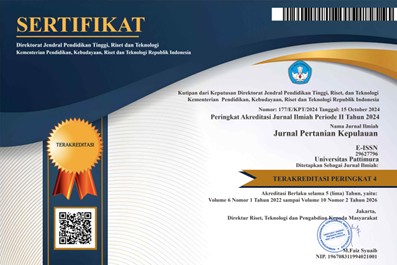
Publication Ethics
Publication ethics adapted by Jurnal Pertanian Kepulauan refers to The Committee on Publication Ethics (COPE) and Regulation of the Head of LIPI Number 5 of 2014 concerning the Code of Ethics for Scientific Publications.
DUTIES OF AUTHORS
1. Reporting Standards:
The Authors of original research reports must provide an accurate description of the work done and an objective discussion of its importance. Furthermore, the underlying data must be correctly described in the submitted document. In order to encourage others to reproduce the work, sufficient descriptions and references need to be included. Fraudulently or knowingly inputting inaccurate statements is unethical behavior and extremely unacceptable.
2. Data Access:
When necessary, Authors are required to provide the primary data related to the paper for editorial review.
3. Originality and Plagiarism:
4. Multiple, Redundant, or Concurrent Publication:
Manuscripts containing essentially the same research work should not be published in more than one journal or primary publication as it is assumed dishonest and inexcusable publishing behavior.
5. Acknowledgement of Sources:
It is an obligation to provide proper acknowledgment for the work of others. The authors have to cite the articles that influenced the characteristics of the reported work.
6. Authorship of the Paper:
Authorship, which involves listing specific individuals as co-authors, needs to be limited to those who have made significant contributions to the conception, design, execution, or interpretation of the reported study. Meanwhile, contributors or co-authors should be noted or identified exclusively for those who partake in particular research projects' substantive aspects. The corresponding author needs to guarantee that only eligible co-authors should be included in the paper. The final version of the paper and its submission for publication has been seen and accepted by these individuals.
7. Disclosure and Conflicts of Interest:
8. Fundamental errors in published works:
Any significant error or inaccuracy in the published work discovered by the author should be retracted and corrected by directly notify the journal's editor or publisher.
9. Hazards and Human or Animal Subjects:
1. Fair Play:
3. Disclosure and Conflicts of Interest:
4. Publication Decisions:
The editorial board of the Journal of Small Island Agriculture is liable for figuring out which of the submitted research papers shall be published. Meanwhile, the decisions should be based on the research's validation in question and its significance to researchers and readers. The editors can be guided by the journal's editorial policy and restricted by constitutional requirements such as defamation, breach of copyright, and plagiarism. Furthermore, in resolving the decisions, the editor may consult with other editors or reviewers.
5. Review of Manuscripts:
The editor must guarantee that every manuscript's composition has been assessed for its authenticity while also organizing and utilizing peer review reasonably and wisely. Furthermore, the editor needs to clarify to the authors the peer review processes and identify which aspects of the article have been peer-reviewed. By selecting people with sufficient mastery and excluding those with conflicts of interest, editors must perform influential peer reviewers for papers considered for publication.
DUTIES OF REVIEWERS
1. Contribution to Editorial Decisions:
Peer review helps the editor determine editorial choices and helps the authors refine the paper through editorial discussions.
2. Promptness:Any chosen reviewer who feels unfit to observe the research work in a manuscript or recognizes that an immediate review would not be possible is required to notify the editor and not further take part in the review process.
3. Standards of Objectivity:
Reviews need to be carried out objectively, personal judgment is unseemly, and the reviewer needs to express their viewpoints with supporting information explicitly.
4. Confidentiality:
All submitted manuscripts need to be treated as secret reports. Furthermore, except for those authorized by the editor, they should not be displayed or examined with others.
5. Disclosure and Conflict of Interest:
It is compulsory to treat unique details or insights gained through peer review as confidential information and not exploited for individual gain. Moreover, reviewers do not need to evaluate manuscripts with conflict of interest because of collaborative competition or other associations or connections with any of the authors, businesses, or organizations.
6. Acknowledgement of Sources:
Reviewers ought to differentiate between similar published articles that the authors have not referred to. Likewise, the appropriate citation should be applied to every description where a previously recorded interpretation, inference, or statement is used. Finally, reviewers need to likewise bring to the editor's notice any overlap or noticeable similarity between the manuscript under scrutiny and any other published articles they have personal knowledge of.
Screening for Plagiarism
Plagiarism is checked for using the application, Turnitin.
Digital Archiving
This journal utilizes the Indonesia One Search (IOS) and Garuda (Garba Rujukan Digital) system to create a distributed archiving system among participating libraries and permits those libraries to create permanent archives of the journal for purposes of preservation and restoration.



.png)


